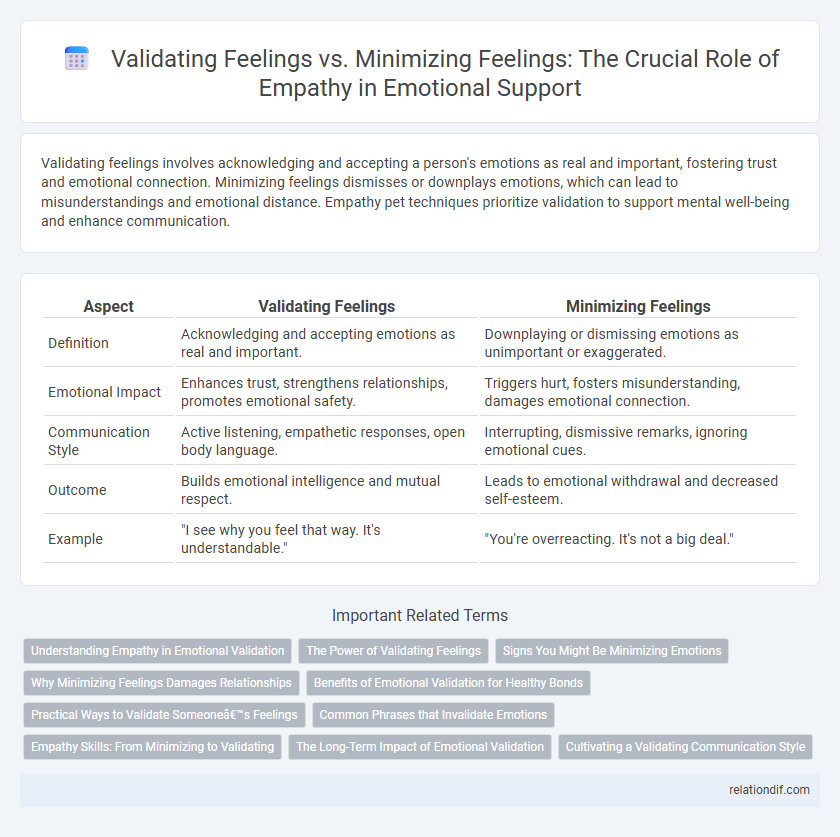Validating feelings involves acknowledging and accepting a person's emotions as real and important, fostering trust and emotional connection. Minimizing feelings dismisses or downplays emotions, which can lead to misunderstandings and emotional distance. Empathy pet techniques prioritize validation to support mental well-being and enhance communication.
Table of Comparison
| Aspect | Validating Feelings | Minimizing Feelings |
|---|---|---|
| Definition | Acknowledging and accepting emotions as real and important. | Downplaying or dismissing emotions as unimportant or exaggerated. |
| Emotional Impact | Enhances trust, strengthens relationships, promotes emotional safety. | Triggers hurt, fosters misunderstanding, damages emotional connection. |
| Communication Style | Active listening, empathetic responses, open body language. | Interrupting, dismissive remarks, ignoring emotional cues. |
| Outcome | Builds emotional intelligence and mutual respect. | Leads to emotional withdrawal and decreased self-esteem. |
| Example | "I see why you feel that way. It's understandable." | "You're overreacting. It's not a big deal." |
Understanding Empathy in Emotional Validation
Validating feelings involves recognizing and affirming another person's emotions, which fosters trust and emotional connection. In contrast, minimizing feelings dismisses or downplays emotions, leading to misunderstandings and emotional distancing. Understanding empathy in emotional validation requires actively listening and genuinely acknowledging the emotional experiences of others without judgment or contradiction.
The Power of Validating Feelings
Validating feelings enhances emotional connection by acknowledging and respecting an individual's experience, fostering trust and psychological safety. It supports mental health by reducing feelings of isolation and promoting emotional regulation. Minimizing feelings, in contrast, often leads to increased distress and disengagement, undermining effective communication and empathy.
Signs You Might Be Minimizing Emotions
Ignoring or dismissing someone's feelings by stating they're overreacting often signals minimizing emotions. Frequently changing the subject or making light of emotional conversations can undermine genuine expression. Avoiding acknowledgment of emotional pain or telling others "it's not a big deal" are key signs you might be minimizing their feelings.
Why Minimizing Feelings Damages Relationships
Minimizing feelings dismisses a person's emotional experience, causing them to feel unheard and misunderstood, which erodes trust and intimacy in relationships. Empathy and validation strengthen emotional connection by affirming the other person's emotions as real and important. Consistent minimization can lead to resentment and emotional distance, undermining long-term relationship health.
Benefits of Emotional Validation for Healthy Bonds
Emotional validation strengthens trust and deepens connections by acknowledging and respecting others' feelings, fostering a safe environment for open communication. Validating emotions reduces stress and emotional pain, promoting mental well-being and resilience within relationships. In contrast to minimizing feelings, validation encourages empathy and mutual understanding, essential for healthy and lasting bonds.
Practical Ways to Validate Someone’s Feelings
Acknowledge the person's emotions by using reflective statements like "It sounds like you're feeling overwhelmed," which shows you are truly listening and understanding. Offer supportive body language such as nodding and maintaining eye contact to reinforce your recognition of their feelings without judgment. Avoid dismissive phrases and instead ask open-ended questions like "Can you tell me more about what made you feel this way?" to encourage deeper expression and validation.
Common Phrases that Invalidate Emotions
Common phrases that invalidate emotions include "You're overreacting," "It's not a big deal," and "Just get over it," which dismiss the individual's genuine feelings and hinder emotional expression. Such statements undermine empathy by suggesting that emotions are irrational or exaggerated, leading to increased emotional distress and decreased trust. Using validating language like "I understand this is hard for you" fosters emotional safety and strengthens interpersonal connections.
Empathy Skills: From Minimizing to Validating
Effective empathy skills involve validating feelings by acknowledging and reflecting emotions sincerely, which fosters trust and connection. Minimizing feelings, such as dismissing or downplaying someone's emotions, undermines empathy and can lead to emotional disconnection. Mastering the shift from minimizing to validating feelings enhances interpersonal communication and emotional support.
The Long-Term Impact of Emotional Validation
Emotional validation fosters trust and strengthens interpersonal relationships by acknowledging and respecting an individual's feelings, leading to improved mental health and resilience over time. Minimizing feelings, conversely, can cause emotional suppression, increased stress, and a higher risk of anxiety and depression. Consistent validation contributes to long-term emotional regulation and self-esteem, promoting psychological well-being and healthier social connections.
Cultivating a Validating Communication Style
Cultivating a validating communication style involves actively acknowledging and affirming others' emotions, which fosters trust and emotional safety. Validating feelings encourages open dialogue and strengthens relational bonds by showing empathy and understanding. Minimizing feelings dismisses emotional experiences, often leading to disconnection and decreased psychological well-being.
Validating feelings vs minimizing feelings Infographic

 relationdif.com
relationdif.com